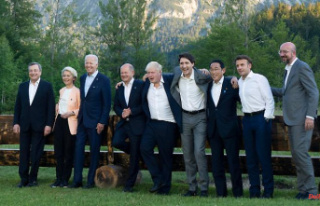The heating season starts in a hundred days. Then there will be a rude awakening for many people in Germany: heating costs will increase dramatically. On Sunday evening, the guests at "Anne Will" will discuss what costs and state aid we can expect in the near future.
The situation is serious. Because of alleged maintenance work, the Russian state-owned company Gazprom has reduced the amount of gas that normally flows through the Nord Stream 1 pipeline. In July, the pipeline is even to be completely closed for ten days. First of all, that's nothing special. This is the regular annual maintenance of the line. But what would happen if Russian President Vladimir Putin decided not to open the line afterwards? A horror scenario, is the opinion of the guests on the ARD talk show "Anne Will" on Sunday evening, but nothing that Germany cannot cope with.
At the moment, nobody can calculate with 100 percent what Russian President Vladimir Putin intends to do, says the FDP's deputy leader, Johannes Vogel. "The situation is very serious." What we are experiencing is what was warned about all along, that is now catching up to us," says Vogel at Anne Will. And further: "If you don't think far enough, you become dependent. And Putin is letting us feel that now."
This is exactly where Jens Spahn intervenes, the deputy leader of the CDU, who repeatedly demonstrates his attachment to Johannes Vogel when the two fall into the friendly "Du". Above all, Spahn criticizes that the federal government has acted too haphazardly in recent months. He wants to know why people are only now talking about generating electricity from coal. And why hadn't the traffic light coalition introduced financial incentives for people who saved energy long ago? And he also wants to know why we still don't work enough with biogas. "The federal government has no plan. The fact is: we are not well prepared for everything we do. We have no idea how we can become independent of Russia through our own actions."
Of course, SPD General Secretary Kevin Kühnert cannot let that sit on his back. He seems combative, even if his traffic light colleague Vogel does not support him much in the dispute with Spahn. This government is not one that "indulges in horror scenarios". The traffic light government diversified the sources of gas. "We're making sure that Germany has a strong economic negotiating position to get gas from other places if Putin were to turn Nord Stream 1's throttling into a closure." In addition, Kühnert wants Germany to become independent of despotic rulers, but also of fossil fuels in general.
"I wouldn't see it that badly," says the guest who should know, energy economist Claudia Kemfert. The gas storage should be up to 80 percent full by October 1st, and that would be manageable, she says. Germany gets gas from countries like Norway and the Netherlands. "We can pay high prices and are currently buying the liquid gas away from the Asians." Nevertheless, it makes sense to save gas. The federal government is still promoting combined heat and power plants. "That should be abolished immediately," says Kemfert. A heat pump booster program must urgently be launched for private households and the installation of gas heating must be stopped. "We lost valuable time. We should have prepared better since the beginning of the war."
But how should things continue in the short term? Especially people who have little money often don't know what to buy a meal from at the end of the month. According to critics, the two relief packages from the federal government amounting to 30 billion euros did not achieve that much. Jens Spahn thinks so too: "It's quite an art: Thirty billion relief, of which in the end nobody really notices." The fuel discount and 9-euro ticket would expire after the summer holidays and could no longer be used to commute to work. And the cheap train ticket in particular is ineffective in the country if there are no trains at all. Then there was a 300-euro flat rate, in which pensioners and students were forgotten.
The journalist and author Anja Mayer cannot accept that. Of course, a subsidy for basic services would be helpful, and many poor people could use the cheap train ticket for excursions. "And we don't stop after this help," adds Kevin Kühnert.
He explains: "There is no single measure that ensures that all households are relieved in the same way. It is about a mix of measures that comes close to this goal." The next measures must be designed to reach only people with low or middle incomes, says the SPD general secretary.
Energy economist Kemfert kept the really bad news until the end of the program: "There is no possibility that energy prices will fall again," she says - with one exception. Germany must get away from fossil fuels as quickly as possible. Otherwise there is a risk of ancillary rental costs increasing fourfold in the next year and a half. "It could be so brutal next winter."












